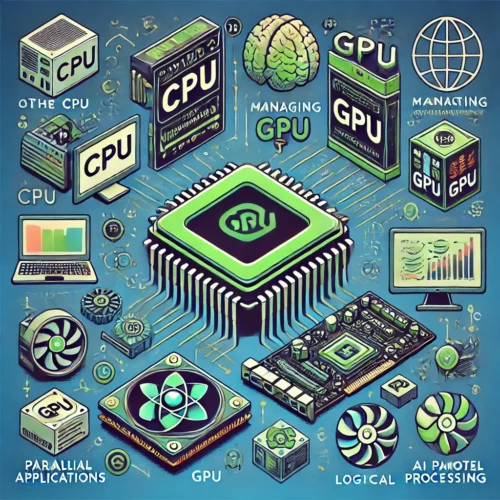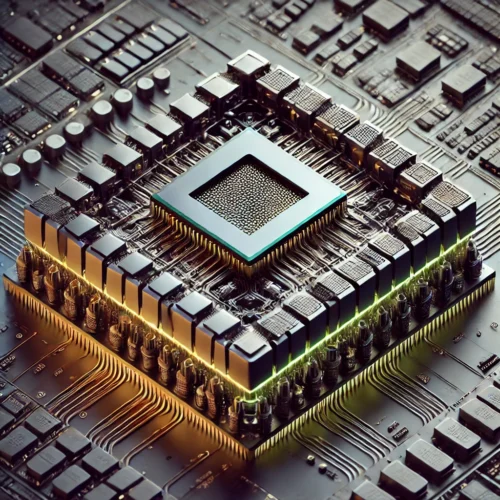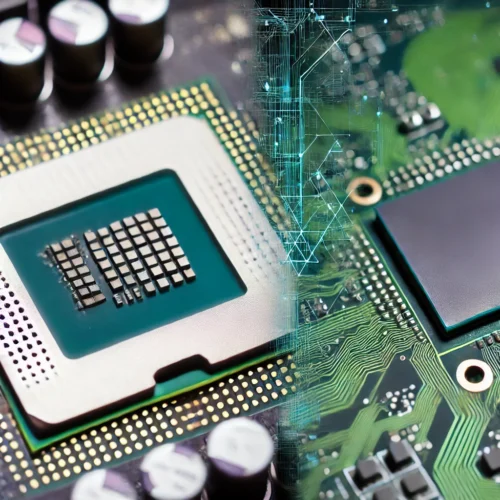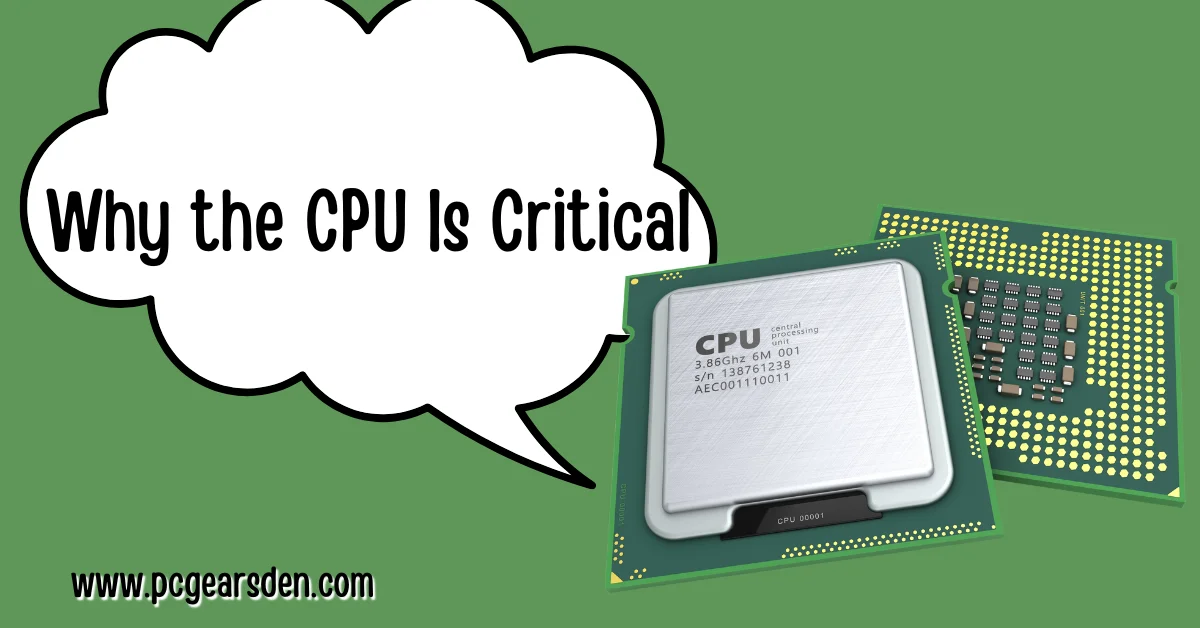In today’s tech world, GPUs (Graphics Processing Units) have become incredibly powerful, often handling complex tasks like video rendering, gaming, and even AI model training. With such capabilities, many wonder, “Do we still need CPUs?” The short answer is yes, and here’s why: while GPUs are designed to excel at specific types of tasks, the CPU (Central Processing Unit) plays an irreplaceable role in managing the overall functionality of a computer. Simply put, the CPU is critical for keeping everything running smoothly, no matter how powerful the GPU becomes.
Understanding the Basics: What Do CPUs and GPUs Do?
To understand why the CPU is critical, it’s essential to grasp what each component does. The CPU is often referred to as the “brain” of the computer. It handles general-purpose tasks, which include running your operating system, executing programs, and managing everything from opening applications like Google Chrome to handling logical operations.
On the other hand, the GPU specializes in handling parallel tasks, making it ideal for applications where vast amounts of data need to be processed at once. Think of tasks like rendering video frames, processing graphics for gaming, or performing heavy mathematical calculations in AI models. While these tasks are crucial, they are specific in nature, and the GPU cannot manage the diverse array of tasks that a CPU handles every second.
Different Tasks for CPU and GPU: The Separation of Roles
The CPU is critical because it performs a variety of tasks that cannot be offloaded to a GPU, no matter how powerful that GPU becomes. CPUs excel at tasks that require sequential processing, meaning operations that must be completed in order, step by step. Examples of such tasks include loading an operating system, running basic applications, and performing logical computations.
In contrast, GPUs shine in tasks that can be divided into smaller, repetitive actions that can be processed at the same time—this is known as parallel processing. A good example of this would be rendering a video or running a game at high resolution. The GPU can take all the data and process it simultaneously, making it incredibly efficient at specific tasks. However, this efficiency doesn’t extend to tasks requiring sequential logic, which is why the CPU is critical to the overall functioning of any computing system.

Single-Threaded vs. Parallel Processing: A Key Difference
One of the main reasons the CPU is critical is because of its efficiency in handling single-threaded tasks. Single-threaded operations are those that must be performed in a specific sequence, where each step depends on the completion of the previous one. For example, when you open your email application or boot up your computer, the operations need to happen in a defined order. This is where the CPU’s ability to handle sequential tasks makes it indispensable.
On the flip side, parallel processing, which is the GPU’s forte, works best for tasks that can be divided into smaller chunks that don’t depend on one another. This is why GPUs are excellent at tasks like rendering or gaming, where it can break the job into many small tasks and work on them all at once.
CPU and GPU: A Symbiotic Relationship
The relationship between the CPU and GPU can be compared to that of a father and son, where the CPU acts as the father, guiding and managing the overall operation, while the GPU, like the son, carries out specific tasks with precision. Although the GPU is powerful, it relies on the CPU to provide the instructions and data it needs to function. In this sense, the CPU is critical because it acts as the conductor, ensuring that all components, including the GPU, work together harmoniously.
For example, when you run a game, the GPU handles the graphics rendering, but it’s the CPU that takes care of loading the game, managing the inputs (keyboard and mouse), and running the game logic. Without the CPU’s ability to handle these tasks efficiently, the game wouldn’t run as smoothly, no matter how powerful the GPU is.
The CPU’s Critical Role in Logical and Arithmetic Operations
Beyond managing the operating system and applications, the CPU is critical for performing logical and arithmetic operations. These are tasks that involve decision-making and calculations based on logic, such as determining whether one value is greater than another or calculating the result of an equation. Such tasks are central to the functioning of any computer system and cannot be offloaded to the GPU.
While GPUs are designed to handle massive calculations, particularly floating-point operations (mathematical calculations involving decimals), they are not equipped to handle the wide range of logical operations that the CPU performs. In essence, the CPU is critical for ensuring that your computer can think logically, process instructions, and carry out tasks that require careful decision-making.

Real-World Applications: Where the CPU Shines
While GPUs are often seen as the powerhouse for specific tasks, the CPU is critical in everyday applications. Imagine booting up your computer in the morning. The CPU ensures that your operating system is loaded correctly and that all necessary background processes are running. Once you open an app, like a web browser, the CPU coordinates the flow of data, ensuring that everything from loading web pages to running scripts happens seamlessly.
Another real-world example is when you’re editing a document or creating a spreadsheet. These tasks might not require the massive power of a GPU, but they do demand the precision and control that only a CPU can provide. Even when using basic software like word processors or spreadsheets, the CPU is critical for handling all the underlying operations, from displaying text to running the application itself.
Why “CPU is Critical” Even in the Age of AI and High-End GPUs
With the rise of artificial intelligence (AI) and the increasing power of GPUs, it’s easy to assume that the CPU’s role might be diminishing. However, that’s far from the truth. Even in advanced computing scenarios, the CPU is critical for orchestrating the flow of data between different components. For example, when training large AI models, the GPU handles the heavy lifting by performing the necessary mathematical computations, but it’s the CPU that manages the overall process, feeding data to the GPU and ensuring that the tasks are completed in the right order.
Additionally, many AI models rely on pre-processing tasks, which involve cleaning and organizing data before feeding it into the GPU for training. These tasks are often handled by the CPU, reinforcing the idea that the CPU is critical even in cutting-edge technologies.

CPU and GPU: Complementary, Not Competitive
In conclusion, the CPU is critical because it provides the foundation upon which the GPU can excel. Both components have their distinct roles, and one cannot replace the other. While GPUs continue to become more powerful, they are designed for specific tasks that involve parallel processing. The CPU, on the other hand, is responsible for handling a wide range of tasks that require sequential processing, logical decision-making, and overall management of the computer system.
In the end, you’ll always need both components working together to get the most out of your technology. Whether you’re gaming, rendering videos, or simply browsing the web, the CPU is critical for ensuring that your computer runs smoothly and efficiently.
Discover the Top Gaming GPUs for 2024 👑 – Upgrade your gaming experience with the latest and most powerful GPUs. Check them out here.
For more information related to CPUs v GPUs you can click here.
FAQs
Q: Why is the CPU so important?
The CPU (Central Processing Unit) is the brain of the computer. It handles all critical tasks such as running the operating system, executing applications, and managing input/output operations. The CPU controls the flow of data, ensures instructions are processed in the right sequence, and manages the communication between all computer components, making it crucial for efficient performance.
Q: Why is CPU more important than GPU?
The CPU is more important for general-purpose tasks because it is designed to handle a wide variety of instructions that require precision and sequence, such as running your operating system, browsing the internet, or managing software applications. While the GPU is powerful for specific tasks like gaming or AI training, the CPU is critical for most daily computing activities that require sequential processing and logic-based operations.
Q: Why is CPU the heart of a computer?
The CPU is often referred to as the heart of the computer because it coordinates and manages all essential functions. From loading applications to executing commands, the CPU ensures that data flows smoothly between hardware components and software applications, making it indispensable for keeping the system running.
Q: What is the problem of CPU?
One of the main limitations of a CPU is that it can struggle with parallel processing, meaning it is less efficient at handling multiple repetitive tasks at once compared to a GPU. Additionally, as computing tasks become more specialized and data-intensive, CPUs can experience bottlenecks when managing highly complex workloads, especially those requiring heavy mathematical computations.
